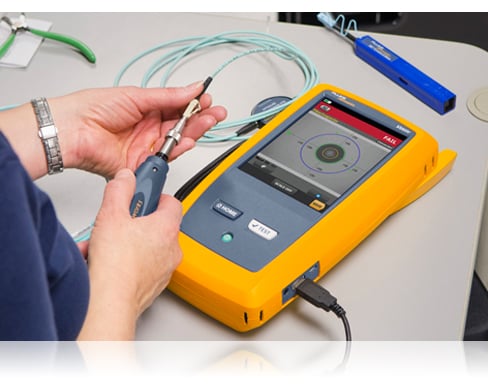Checking Out the Conveniences of Optical Fiber Testing for Improved Communication Solutions
The significance of optical fiber screening in modern interaction systems can not be overemphasized, as it offers as a structure for making certain network reliability and performance. Utilizing innovative approaches such as Optical Time-Domain Reflectometry (OTDR) and insertion loss analysis, companies can not just determine faults yet additionally optimize their configurations. This positive screening approach has profound ramifications for signal quality and functional effectiveness, raising the inquiry of just how these practices contribute to lasting sustainability in an ever-evolving technological landscape. Recognizing these dynamics is essential for stakeholders intending to maintain an affordable side.
Significance of Optical Fiber Screening
The value of optical fiber screening can not be overstated in today's data-driven setting. As organizations progressively rely upon high-speed data transmission for day-to-day procedures, the honesty and efficiency of optical fiber networks are vital. Checking makes sure that these networks can sustain the substantial amounts of data created and transmitted flawlessly, fostering efficient interaction and connection.
Optical fiber testing offers multiple critical features, consisting of validating installation high quality, identifying possible mistakes, and identifying total system performance. Regular testing can avoid costly downtimes and solution disruptions, allowing organizations to maintain functional connection. It helps in conformity with sector criteria and regulations, guaranteeing that fibre optic setups fulfill needed requirements for safety and dependability.
Furthermore, testing can boost the long life of fiber optic systems. By proactively determining concerns such as signal loss, attenuation, or port failings, organizations can deal with issues prior to they escalate, therefore prolonging the life of their framework. In recap, optical fiber screening is not simply a technical demand yet a strategic financial investment that enhances network reliability, maximizes efficiency, and eventually sustains the growth and efficiency of modern communication systems.
Trick Testing Techniques

OTDR is an important strategy used to identify mistakes, action splice losses, and analyze the total integrity of a fiber optic link. By sending a pulse of light down the fiber and analyzing the shown light, professionals can identify locations of mistakes and evaluate the network's performance over lengthy ranges.
Insertion loss testing measures the quantity of signal loss that takes place when light go through a connection or splice. This technique is vital for verifying that connections fulfill specific loss thresholds, which is necessary for preserving optimal efficiency in communication systems.
Optical return loss screening evaluates the quantity of light mirrored back in the direction of the resource because of blemishes in the fibre or connections. High return loss values indicate much better performance and decreased signal destruction.
Together, these screening approaches supply an extensive analysis of fiber optic networks, ensuring their integrity and functionality in varied communication applications.
Effect on System Performance
Reliable optical fiber testing directly influences the total performance of interaction systems. By making certain the integrity of fibre optic cords, testing recognizes potential mistakes such as attenuation, splice loss, and adapter imbalance. These issues can substantially weaken signal quality, leading to interruptions and decreased information transmission speeds.

Moreover, routine optical fiber screening adds to long-term system sustainability. It makes it possible for why not find out more early detection of damage, permitting timely maintenance and upgrades prior to significant failures take place. This not just lengthens the life expectancy of the facilities however additionally makes sure that interaction systems stay affordable in terms of efficiency.
Cost-Effectiveness and Efficiency
Cost-effectiveness is a vital factor to consider in the implementation and upkeep of optical fiber networks. Executing durable optical fibre screening treatments can substantially lower functional costs by determining problems prior to they intensify right into major troubles. robotic vision. By identifying mistakes, attenuation, and other performance barriers early, organizations can stay clear of costly repair services and downtime, which can disrupt services and bring about income loss
In addition, effective screening methodologies simplify the installment process, allowing specialists to function better. This converts to decrease labour prices and faster project completion times. Advanced screening equipment, such as Optical Time Domain Reflectometers (OTDRs), makes it possible for an accurate assessment of fibre top quality, guaranteeing that just optimal products are utilized, thus minimizing waste.
Routine testing additionally adds to better resource allowance. By comprehending the network's performance, organizations can make informed decisions regarding upgrades and expansions, guaranteeing that financial investments are made where they are most needed. In recap, optical fibre screening boosts cost-effectiveness and effectiveness, sustaining the lasting sustainability and competition of communication systems in a progressively requiring market.
Guaranteeing Long-Term Reliability
Implementing extensive optical fiber screening not only boosts expense financial savings and operational performance yet likewise plays a pivotal role in making sure the long-term dependability of interaction networks. Regular screening techniques, consisting of depletion and transmission capacity evaluations, help identify prospective deterioration in fiber efficiency before it results in service disturbances.
By employing innovative testing techniques, network operators can identify mistakes or weaknesses in the fibre framework, allowing for timely removal. This positive approach lessens downtime, making sure that interaction systems stay useful and efficient. Regular screening adds to the growth of a much more durable network, as operators can adapt and enhance their facilities based on real-time information insights.
Furthermore, guaranteeing conformity with industry standards via optical fibre screening you can look here reinforces the high quality and stability of the entire communication system. This adherence not only strengthens confidence among stakeholders however additionally aligns with governing requirements, which are increasingly strict.
Verdict
In final thought, optical fiber testing offers as an essential part in enhancing communication systems. By using numerous testing methods, such as OTDR and insertion loss evaluations, networks can attain ideal efficiency and dependability.